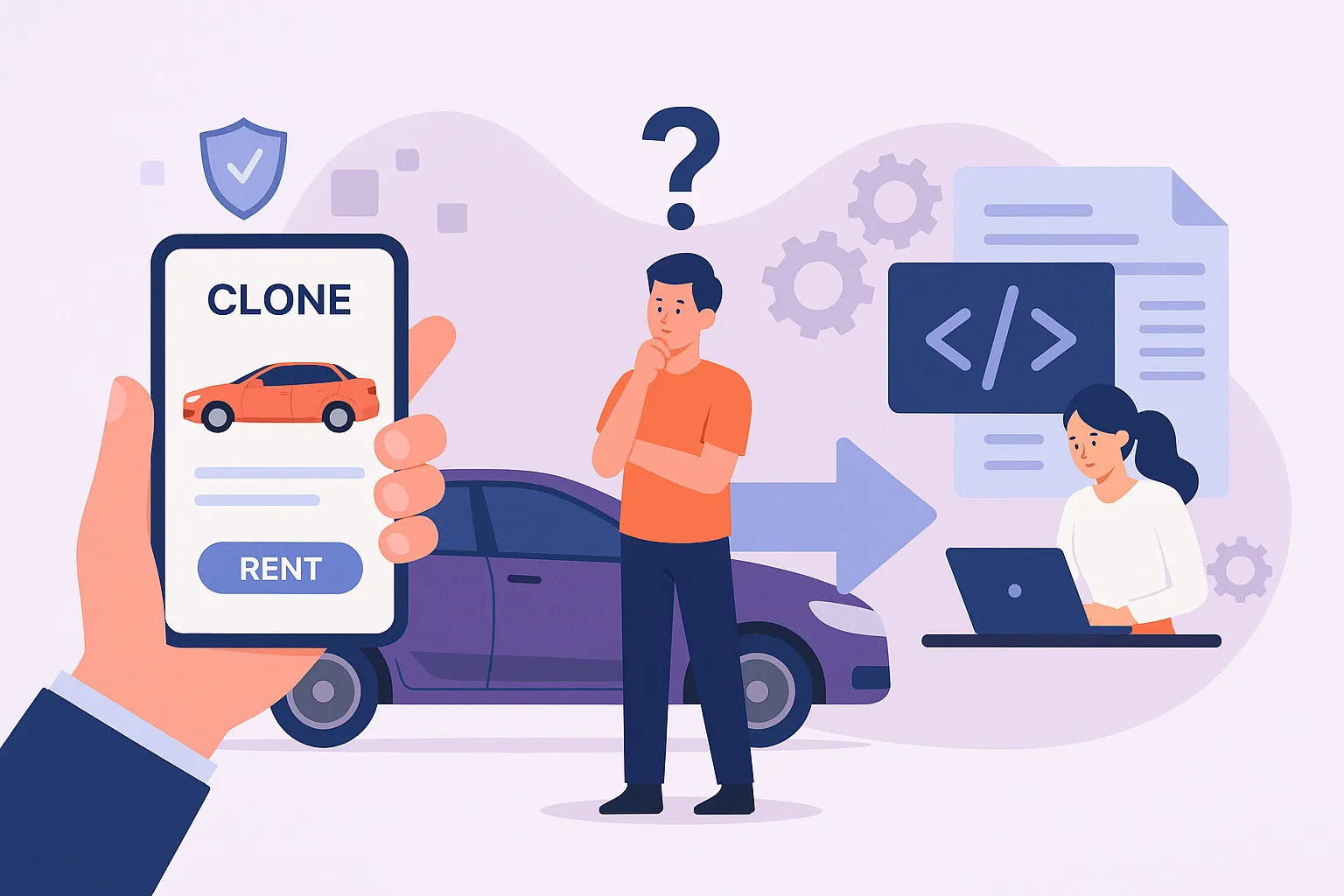In 2010, Andre Haddad loaned out his own car in San Francisco and accidentally sparked a peer-to-peer mobility movement. Fifteen years later, Turo clone clocks nearly a billion dollars in annual revenue, proving that “Airbnb-for-cars” isn’t a quirky idea—it’s big business. Yet for every founder itching to launch the next neighborhood car-sharing success story, the same question keeps them up at night: Do I start from pixel-zero or piggy-back on a ready-made clone?
Scroll any startup subreddit and you’ll see both camps. Some swear by writing fresh code, others brag about shipping an MVP in 90 days with an off-the-shelf framework. Meanwhile, capital is tighter, user patience shorter, and rivals multiply faster than late-night pizza memes. In this climate, speed and risk-management beat artisan craftsmanship nine times out of ten.
Today we’ll unpack why a growing wave of founders are swerving the custom-dev road and opting for Miracuves’ battle-tested Turo Clone instead—without sacrificing brand, scalability, or the adrenaline rush of innovation. Buckle up; let’s hit the accelerator with Miracuves in the driver’s seat.
If you’re curious about peer-to-peer car sharing, check out our detailed guide on what the Turo app is and how it works to connect car owners with renters.
1. The Startup Dilemma: Build From Scratch or Leverage a Clone?
Custom development sounds romantic until you crunch the numbers. A full-featured ride-sharing platform (driver app, rider app, admin portal, OTA updates, PCI-compliant payments, telematics, insurance APIs) .
Clone frameworks flip the script: proven architecture, pre-integrated GPS tracking, and UX flows users already understand. You focus on market fit—fleet acquisition, local insurance partnerships, referral hacks—while we handle the code.
2. Why Turo’s Model Still Revs Hard in 2025
- Market momentum: Global car-sharing revenue is on track to surge from US $4.8 B in 2024 to $20.5 B by 2033—a brisk 17 % CAGR That’s a highway-sized TAM for niche entrants (think vintage EVs, adventure vans, or corporate fleet sharing).
- Platform proof: Turo itself hit US $958 M in 2024 revenue with profitable operation. Bottom line: the playbook works.
- IPO pause = opportunity: Turo shelved its 2025 public-listing dreams to invest inward leaving greenfield pockets in underserved cities where nimble startups can dominate before the giant rolls in.
3. Ten Reasons Founders Pick the Miracuves Turo Clone
Fast Go-to-Market
Launch in 3-9 days, not seasons. Miracuves ships a white-label build after a single discovery call, complete with iOS, Android, and responsive PWA.
Proven User-Experience Blueprints
Borrow muscle-memory UX (search, filter, calendar, in-trip chat). Riders feel at home; hosts trust the flow. You reduce churn-inducing surprises.
Lower Up-Front Engineering Cost
Typical total cost of ownership for our clone averages 40–60 % less than bespoke codebases. Savings reroute to fleet incentives or influencer campaigns.
Maintenance & OTA Updates Baked-In
Push new features (say, Apple Wallet keys) across all handsets automatically. No midnight regression hunts.
Enterprise-Grade Scalability
Miracuves uses micro-services, auto-scaling Kubernetes clusters, and CDN-served image optimization, handling spikes during long-weekend road-trip frenzies.
Compliance & Insurance Modules
From KYC to GDPR to region-specific insurance deductibles—our compliance stack is plug-and-play, saving founders months of legal grey-hair.
Built-In Growth Loops
Referral promo codes, loyalty badges, and push-notification “price drops” are pre-wired, turning smartphones into your street-team.
Flexible Branding
Swap color palettes, icon packs, and hero photography without touching core logic. Your brand, our reliable engine.
Rich Analytics Dashboard
Fleet-utilization heatmaps, host earnings per VIN, cancellation drivers—data you’d otherwise bolt on later.
Community & Support
24/7 Slack channel, quarterly roadmap webinars, and a library of marketing playbooks. Founders aren’t left steering solo.
According to TechCrunch, Turo has decided to scrap its plans for a 2025 IPO.
4. Cost Breakdown: Clone vs Custom
| Item | Custom Build (Avg.) | Miracuves Turo Clone |
| UI/UX Design | $15 K | Included |
| Core Development | $80–100 K | $2,899.00 |
| QA & Security | $10 K | Included |
| Year-1 Maintenance | 15 % of dev cost | Included |
| Launch Timeline | 6–10 months | 3-9 days guaranteed delivery |
5. Success Stories on the Fast Lane
- IslandRides (Bali): Niche fleet of surf-rigged Jeeps hit break-even in 90 days after launching on Miracuves clone; 70 % of bookings came via built-in referral loop.
- EcoWheels (Berlin): Leveraged our carbon-offset plug-in to market a guilt-free ride; saw 35 % higher host retention than local incumbents.
6. How Miracuves Future-Proofs Your Venture
We track OS updates, insurance regulations, and payment rail APIs so you don’t scramble every time Apple or RBI flips a switch. Our modular codebase means you can bolt on crypto payments, AI-powered pricing, or even a micro-lease feature tomorrow. Plus, our Turo Clone page details add-ons like connected-car telematics or EV-only filters that match evolving consumer vibes.
Read More : The Ultimate Guide to Starting a Car Rental Business
Conclusion :
Founders win when they focus on traction, not tangled code. A Miracuves Turo Clone delivers that unfair head start—lower cap-ex, faster market entry, and the confidence of a track-recorded tech partner. Keep an eye on emerging trends like in-dash OTA upgrades and AI-driven dynamic pricing; they’ll separate hobby projects from category leaders.
At Miracuves, we help innovators launch high-performance app clones that are fast, scalable, and monetization-ready. Ready to turn your idea into reality? Let’s build together.
FAQs
1. Will using a clone make my app look “cookie-cutter”?
Not at all. The core engine is shared, but you control branding, feature toggles, and UX polish. Think of it like Shopify themes—same backend, different storefront vibe.
2. Can I add unique features later?
Yes. Our modular micro-services let you plug in extras—EV-only search, AI pricing, AR parking guides—without rewriting the base.
3. How secure is the Miracuves stack?
We follow OWASP Top 10, encrypt all PII at rest and in transit, and undergo quarterly penetration tests. PCI-DSS-compliant payment gateways are pre-integrated.
4. What about regional insurance requirements?
Our insurance module supports variable deductibles, liability tiers, and policy document uploads. We customize wording for each jurisdiction you launch in.
5. Do hosts and guests need separate apps?
No. The clone ships with a dual-mode switch—one install, two personas. That halves your app-store marketing overhead.
6. How does pricing work?
We charge a one-time license plus optional support retainer. No revenue-share pinch once you cross scale milestones.
Related Articles :








